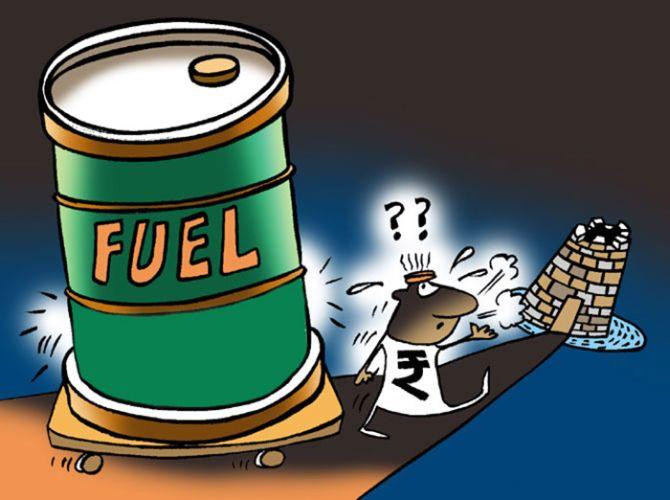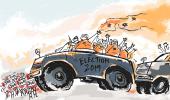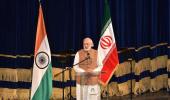The surge in oil prices has also affected the rupee, which hit a 6-week low of 70.25 on Friday against the dollar.
Illustration: Uttam Ghosh/Rediff.com

Rising oil prices are the biggest risk to the Indian equity story from a five-year horizon, says Christopher Wood, managing director and equity strategist at CLSA, in his weekly note to investors, GREEd & fear.
He expects oil prices to hit $ 100 per barrel if the US ends all Iran sanction waivers after May 2 and suggests the best way to hedge this risk is to own oil stocks. However, as a base-case, Wood expects US President Donald Trump to soften his stand.
“It is also the case that it makes no sense to pick a row with China on buying Iranian oil, and there will be a row if the waivers are not renewed, at the same time as the Donald is hoping to secure a trade deal, and a ‘win’ with Beijing.
"It is also the case that Saudi Arabia will be less willing to pump extra oil, in response to Trump bullying, than was the case six months ago,” Wood wrote.
The waivers, issued to eight countries for an initial period of 180 days after Washington imposed sanctions against Iran’s oil and shipping sectors from November 5, were widely expected to be renewed.
The possibility of non-renewal has pushed Brent crude oil prices higher by 38 per cent thus far in 2019, to hit the $ 75-per-barrel mark.
The surge in oil prices has also affected the rupee, which hit a 6-week low of 70.25 on Friday against the dollar.
“The rupee is not one of GREED & fear’s favourite emerging market (EM) currencies, even if the Indian stock market is.
"The rupee is certainly not yet cheap on a real effective exchange rate basis, while renewed monetary easing under the new Reserve Bank of India (RBI) leadership means the currency is less protected by high real rates than used to be the case,” Wood says.
Elections & economy
Between the Narendra Modi-led government’s two biggest policy measures - demonetisation/note ban and the introduction of the goods and services tax (GST) - Wood says the former has been a bigger of the two evils that damaged India’s “very large but almost impossible to measure informal economy”.
Though demonetisation was well-intentioned with the aim of encouraging financialisation of the economy and to eliminate “black money”, and the subsequent accelerated flow into financial assets provided a further catalyst for the non-bank financial companies (NBFC) lending boom, Wood believes there is little doubt that there has been collateral damage for the informal sector, which was further exacerbated by GST.
And the most hard hit, according to him, have been the small traders, who are traditional Bharatiya Janata Party (BJP) supporters.
People, Wood feels, are reluctant to admit in public that they are anti-Modi, just as many in the US presidential election did not admit in public that they would vote for Donald Trump.
His base case on the current general election in India remains that Modi will win, albeit with a reduced majority, helped by the following wind provided by the assertive stance he took on the Pakistan issue.
“This explains why Modi has been campaigning hard in recent days in his home state of Gujarat.
"It also explains why Modi’s campaign has not been based on the economy.
"Rather it has been based on a more nationalistic stance, or what his own opponents would call a divisive sectarian stance, helped by the recent confrontation with Pakistan.
"Thus, Modi threatened Pakistan with the ‘mother of nuclear bombs’ last week. This, to GREED & fear, is smart politics even if it might also be viewed as cynical,” Wood wrote.












 © 2025
© 2025